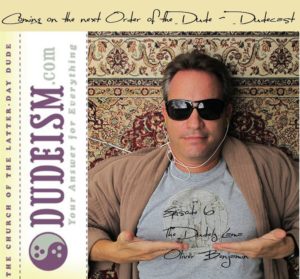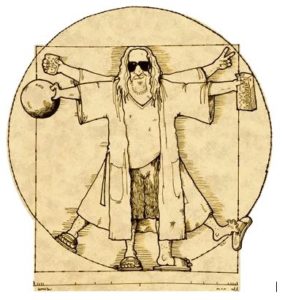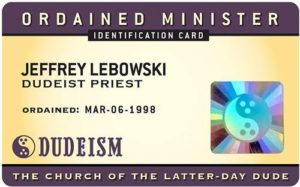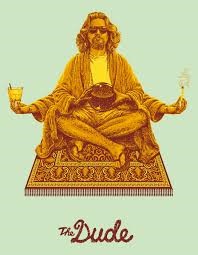DUDEISM TIMELINE
1968 (January 7): Oliver Benjamin was born in Los Angeles, California.
1998: The Coen brothers produced a crime comedy movie The Big Lebowski starring Jeff Bridges as Jeffrey “The Dude” Lebowski as the main character.
2005: In a tourist resort town of Pai, near Chiang Mai, Thailand, Oliver Benjamin saw the movie with friends and a few beers, and experienced a revelation that the movie is a perfect application of Taoist principles for a modern person. Shortly afterwards, he became an evangelist for the movie and founded a new religion, The Church of a Latter-Day Dude, or simply Dudeism. The website, Dudeism.com was launched near the end of the year.
2008: The Dudespaper, the official publication of Dudeism, was launched. Over the following years it collected hundreds of articles by Benjamin and various other practicing Dudeists on various aspects of Dudeism.
2009: Dude De Ching, a translation and reworking of the Tao Te Ching using lines from The Big Lebowski was written.
2009: Oliver Benjamin was invited to deliver the opening benediction to the Los Angeles Lebowskifest, and some 3,000 fans repeated after him as he recited lines from The Dude’s Prayer. This led to him being the subject of a Volkswagen ad campaign that went viral.
2011: The Abide Guide, Dudeist self-help book offering advice on how to be more “Dude-like” in the modern chaotic world, was written.
2014: The Big Lebowski was selected for preservation in the National Film Registry, being considered culturally, historically, or aesthetically significant by the Library of Congress.
2015: Tao of the Dude, a book of essays and quotes providing “awesome insights of the deep Dudes from Lao-Tzu to Lebowski,” was written.
2016: The Dude De Ching was completely rewritten, with a new translation of the original added by the author and eighty-one essays that explained each verse and showed how Dudeism and Taoism are philosophical cousins.
2018: Abide University and Institute was launched. It is intended as a Dudeist “academic-ish” learning center and community.
FOUNDER/GROUP HISTORY

One day in 2005, at the Pai tourist resort near Chiang Mai, Thailand, Oliver Benjamin [Image at right] got drunk at a café and it happened that in this changed state of consciousness he watched The Big Lebowski, a film he’d seen once before but didn’t fully appreciate. According to his own words, that was the moment of his epiphany, when he understood the genius message of the movie. That is how the Church of the Latter-Day Dude originated, and how he became its honorary head, the Dudely Lama.
Dudeists consider the movie The Big Lebowski to be a core source of spiritual and philosophical inspiration, despite the fact that it is a work of fiction. Dudeists view the character of Jeff “The Dude“ Lebowski as a role model with a universal message and an example worth aspiring to.
Under the spell of the hilarious and insightful dialogue of the film, the collective enthusiasm of the audience, and five strong Thai beers, I experienced a striking revelation. It felt like a profound religious experience, just like the one Saint Paul had on the road to Damascus or the one Bob Dylan had after he banged his head in a motorcycle accident. Only, instead of seeing Jesus Christ, I beheld Jeff Bridges in a ratty bathrobe playing a lazy antihero called “The Dude.” The Dude, I felt, could truly be the savior of all mankind, man. Or some of it, anyway“ (Benjamin 2013).
A significant symbolic moment occurred in 2009, when Oliver Benjamin delivered the opening benediction at the Lebowskifest in Los Angeles, while thousands of fans of the movie (most of them not Dudeists) repeated after him as he recited lines from The Dude’s Prayer, a modified version of The Lord’s Prayer of Catholic tradition, which incorporated lines from the film. Soon afterwards, an advertising agency asked if they could film him discussing Dudeism for a Volkswagen ad campaign to support independent cinemas in the U.K. It became a viral hit on You Tube and helped secure a book deal for The Abide Guide, a philosophical investigation into The Big Lebowski and what it all means to him and other Dudeists.
DOCTRINES/BELIEFS

Dudeism does not reject categorization as a religious group, and in fact often has to defend itself from accusations of being a joke, or mock religion. [Image at right]
According to the founder, though Dudeism is a very young organization, its philosophy is ancient: ”The earliest form of Dudeism was the original form of Chinese Taoism, before it went all weird with magic tricks and body fluids” (“What is Dudeism” 2019). Benjamin‘s interpretation of original Daoism is that it claimed no Divine mandate or supernatural aspect. He describes Dudeism as a modern form of Taoism, which has been “translated” into an idiom that modern man can understand and which has been “updated” so it can be related to today (Kosnáč 2017).
The main idea of Dudeism is that:
Life is short and complicated and nobody knows what to do about it. So don’t do anything about it. Just take it easy, man. Stop worrying so much whether you’ll make it into the finals. Kick back with some friends and some oat soda (i.e. beer) and whether you roll strikes or gutters, do your best to be true to yourself and others – that is to say, abide. (”What is Dudeism?” 2019)
It is stressed that life should not be spent trying to gain status or material goods, but should be enjoyed for its own sake. One should avoid suffering by avoiding unnecessary anxiety and adopting a more relaxed attitude towards life. Simple pleasures are the best ones (Kosnac 2017).
Benjamin states that The Dude may seem an unlikely role model, but:
in this day and age where our greatest concerns aren’t Armageddon or the afterlife, but generalized anxiety and existential engagement, the Dude helps us enlighten up to a greater quality of life. We don’t need heroic figures to lead us to a promised land. We need Dudeists to help us abide where we are. The whole point of Dudeism is to be alive while you are alive, here and now, be as alive as possible (Falsani 2011).
The Dude is not a hero to Dudeists because he is lazy or not very ambitious, but because he is independent. And a bedrock of independence is a peace of mind. Being immune to peer pressure and social expectations, concerns about self-worth and status.
Dudeism, in fact, was an ancient tradition which went by many names and fell under many guises: Around about the same time that Lao Tzu’s Taoism sprung up in China, ancient Greece birthed the philosophies of Heraclitus (“Ups and downs, strikes and gutters”), Epicurus (“Just take it easy, man”), and the Stoics (“Can’t be worried about that shit”). Soon afterwards, in the Levant, Jesus Christ preached an extremely Dudely way of life before the Church brushed aside his “lilies of the field” message of mellowing out and celebrating the meek (Benjamin 2013).
Dudeism has deliberately not developed any eschatological expectancy. This is very much in the spirit of Epicureanism which states that we should not worry about gods, good and evil or death, because gods are unknowable, good and evil disputable and when death comes, we shall not be here anymore. (Kosnac 2017). The Dudeist approach to death is that its just a damn shame that we have to die. Thats it. The ideal is to be like The Dude. Other Dudeist characters set as examples worth following are: Lao Tzu, Heraclitus, Epicurus, Snoopy the Dog, Kurt Vonnegut, even Buddha or pre-ecclesiastic Jesus. (“Great Dudes of History” 2019)
Dudeism is syncretic by design. It is meant to be compatible with any other religion, including Christianity, Islam or Judaism. The position of Dudeists is, that if Dudeism helps others to take a more relaxed approach towards their own religion then it has served its purpose. Similarly, a devout believer of any other religion can be considered a Dudeist as well (Kosnac 2017).
One of the essential, though less well-known, orientations of Dudeism can be found in its innate pragmatism and anti-idealism. The Dudeist approach is a rational and skeptic approach, which sees any kind of idealism as suspicious. As Benajmin puts it, “The Dude does not trust big ideas.“ (Personal Interview 2018) He also contends that idealism is very instinctive, which is why it is so hard to cultivate a healthy scepticism. He suggests that to spread an idea like that, one needs to use a good story as a vehicle; otherwise, if one would tour the world with an anti-idealist message, one would not get very far. That is why the movie and the character of the Dude are so important: They provide a mythos that can channel the modern version of Daoism which Dudeism is trying to be. (Personal Interview 2018)
The aim of Dudeism is to reignite a worldview and a lifestyle that rejects the worst excesses of civilization. As Benjamin puts it, civilization is an inherently unnatural mode of living for human beings. Humans supposedly are genetically designed to “take it easy” and “pick fruit on a tropical African savannah, not live in cities and toil away in cubicles.“ (Benjamin 2013). Dudeists appreciate many amazing perks brought by civilization, such as higher standard of living or longer life. They don’t want to go back to hunter-gatherer times, and don’t believe that is even possible. However, despite its many gifts, civilization causes humsurviveans to be at odds with their nature, even though a natural and simple life is more easily attainable than modern culture tends to suggest. Civilization brings with it status anxiety and demands that everyone struggle and work as hard as possible, not because they want to or enjoy it, or even need to survive. Civilization has essentially co-opted the human over-sensitivity to peer-pressure to further its own objectives. As ancient philosophers observed (beginning with Lao Tzu and Epicurus when Chinese and Greek civilization were first getting off the ground), man is not rich due to what he has, but what he doesn’t need. So-called successful people may be richer in wealth or status, but these can be fickle and arbitrary things, while at the same time they are poor in timeless values like peace of mind and independent control over their life. Wealth or status only increases appetite for more of the same, as does the fear of losing it. This generates constant pressure, insatiable hunger and restlessness (Personal Interview 2018).

RITUALS/PRACTICES
Ritual practices are not of a high importance in Dudeism. Nevertheless, some forms have developed over time, or by design. For example, Dudeists have an identification symbol, or a logo – the yin/yang bowling ball [Image at right].
When one wants to become a Dudeist, he or she should want to follow the example of The Dude and Dudeist principles, but in practice, as can be expected, joining is easy, with the Dudeist vow to bring Dudeness being the only requirement: “I vow to uphold the principles of Dudeism: To just take it easy, to be dude (easygoing) to everyone I meet, and to keep my mind limber“ (“Ordination Form“ 2019).
A more comprehensive version of the Dudeist vow is included in The Abide Guide:
As an ordained Dudeist priest, I, NAME, vow:
To just take it easy, man, to spread the Dude word when its not too exhausting.
To always make time to have some burgers, some beers, a few laughs,
to always check in to see what condition my condition is in, [ED: reference to health]
to not treat objects like women, man, to, er… lost my train of thought there,
to keep my mind limber,
to enjoy natural zesty enterprises while fixing the cable, [ED: reference to sexual intercourse]
to never repeat things only because a book instructs me to do so,
and always when the world goes crazy to abide, so help me Dude (Benjamin and Eutsy 2011).

Upon ordination as a Dudeist Priest, one receives a free online certificate of ordination or legitimation as a Dudeist priest. Hard copies of the certificate and other products, such as an I.D card [Image at right] can be purchased.
It’s immediately evident that Dudeists like to play with religious tropes. But they don’t make fun of them in a mocking way; the opposite is true. They do this because they can have a level of respect toward many religious practices (rituals, time spent in community, meditation, etc.), and because they have a beneficial contribution to peoples‘ lives. An example is the prayer section of the Dudeist webpage. One can visit it and offer a prayer. Dudeists don‘t believe anyone listens to the prayers, but through the placebo effect and certain level of self-reflexion needed one can receive some redemption. That is seen as psychologically beneficial. In this way, Dudeists try to get real-life benefits out of religious practices, even if they typically don’t believe in the religious doctrines used to legitimize the practice. They find what works, de-supernaturalize it, give it a zany name and promote it on the website or in their publications (Personal Interview 2018).
Dudeists celebrate several holidays throughout the year, generally Dudeist versions of the holidays found in other cultures like Kerabotsmas, Indudependence Day or Take it Easyster. The most important holiday is on March 6, The Day of the Dude (Benjamin 2013). This is the day on which Dudeism’s seminal text, The Big Lebowski was released publicly. It should be a free day on which all Dudeists should relax even more than usual (Kosnáč 2017).
Bowling is considered one of the ideal leisure pursuits, and organizing Dudeist conventions in bowling alleys is encouraged for its therapeutic and community-building benefits. As Oliver Benjamin states, bowling leagues have similar sociological and psychological benefits as church communities (ABC 2012).
Dudeism endorses meditation and yoga practice with some particular characteristics. The aim is to empty one’s mind. As Benjamin puts it, it is like turning on a radio, but instead of trying to find a channel, one is trying to find the static (ABC 2012). Benjamin is currently developing software to create an online meditation hall. The user can see who else is in the hall, and there will be a timer, background music, and a log of the user’s previous meditation sessions. It will be a tool to provide a sense that one is connected with other people and a way how to keep track of one’s meditation practice. Benjamin believes this should motivate people to try to make meditation a regular practice and furthermore provide a sense of community. An interesting feature is that when the user touches his mouse or touchscreen the timer pauses. The user will thus be inhibited from fiddling with his computer; he should be meditating, after all (Personal Interview 2018).
Yoga is considered very beneficial for one’s health, but the only position considered strictly Dudeist is the horizontal position (lying down on the ground). It should be performed in as relaxed a way as possible (Kosnáč 2017). The Dudeist view on yoga is that anything can be yoga if the right mindset is brought to it and one is as relaxed as possible while performing it. This is inspired by the Taoist principle of wu-wei, or “actionless action“ (Personal Interview 2018).
Dude-jitsu is the Dudeist martial art, though it is a strictly mental one. The idea is to offer mental tools and communication techniques that would help Dudeists to live a life in a manner that allows problems to flow around them.
In Jiu Jitsu, When someone comes at you, everyone knows you should step out of the way. If someone punches you, you shouldn’t let them hit you in the face. However, if someone insults you, we tend to let them hit you (in the ego). Why? Because you we’re not trained to ignore it. You have to train yourself to ignore aggression and not fight back with aggression (Personal Interview 2018).
One should simply avoid conflict, if possible, or find a way to turn the tools of the aggressor against him, if one is capable and clever enough. The ability to just “take it easy“ in the same manner of The Dude when confronted by aggression is the goal of Dude-jitsu (Personal Interview 2018).
ORGANIZATION/LEADERSHIP
Dudeist organizations resemble a very loose networks of practitioners and  sympathisers, and anyone can be ordained as a Dudeist priest. There is no real hierarchy or authority. The Dudely Lama (Oliver Benjamin) considers himself a “janitor” or a “librarian” in the sense that he just maintains the website. An assortment of deputies help manage the site, the forum and various social media pages in which Dudeists interact. Several priests take on fanciful unofficial titles but none are invested with any real power. [Image at right]
sympathisers, and anyone can be ordained as a Dudeist priest. There is no real hierarchy or authority. The Dudely Lama (Oliver Benjamin) considers himself a “janitor” or a “librarian” in the sense that he just maintains the website. An assortment of deputies help manage the site, the forum and various social media pages in which Dudeists interact. Several priests take on fanciful unofficial titles but none are invested with any real power. [Image at right]
Similar unofficial status is conferred to books that are published under the name ”Abide University Press.” The press is not a publishing house, but a stamp of approval for original books, texts and other content which Oliver Benjamin and his collaborators feel have the proper Dudeist spirit and will help promote the philosophy of Dudeism. It can be compared to the ”Imprimatur” seal of approval used by the Catholic church.
There are around 500,000 ordained Dudeist priests (Personal Interview 2018). According to Oliver Benjamin, who is responsible for ordaining most Dudeist priests, and is the administrator of the official Dudeist webpage, probably seventy-five percent of Dudeists are men, mostly under thirty years-old. There are, however, no official statistics. The rough guess of the Dudely Lama on the distribution of Dudeists around the world is sixty percent in the U.S., thirty percent in the U.K., Australia and other English-speaking countries, and ten percent elsewhere (Kosnac 2017).
Dudeism Facebook groups are the largest hubs of Dudeist life, with vivid discussions taking place on daily basis concerning Dudeism and how to apply it into one’s life. The groups are very active, with commentaries routinely going into hundreds and shares into thousands on a  few posts. In January 2019, the biggest group had approximately 32,600 members. Also a place for Dudeists to communicate is the Dudeism Facebook page, which has about 800,000 followers (Dudeism Facebook Group 2019).
few posts. In January 2019, the biggest group had approximately 32,600 members. Also a place for Dudeists to communicate is the Dudeism Facebook page, which has about 800,000 followers (Dudeism Facebook Group 2019).
Nearly all U.S. states recognize the authority of The Church of the Latter-Day Dude to ordain priests, allowing them to perform wedding and burial ceremonies. [Image at right] For this reason the Church of the Latter-Day Dude issues letters of good standing that any ordained Dudeist priest can purchase if required by their local governments (Kosnac 2017:145).
ISSUES/CHALLENGES
In the beginning, Dudeism was a one man show, but that does not apply anymore. However, the character of the Dudely Lama, who despite not being completely essential to the survival of Dudeism anymore, is still its only real mastermind, stabilizing force, largest creative engine. [Image at right] Last but not least, he is also guardian of the Dudeist message as a whole, even its less-known implications like its underlying anti-idealism. Benjamin works on many projects that require his attention, and he admits that he is more a dreamer than a doer, meaning that many projects progress slowly. (Personal Interview 2018)
Dudeism anymore, is still its only real mastermind, stabilizing force, largest creative engine. [Image at right] Last but not least, he is also guardian of the Dudeist message as a whole, even its less-known implications like its underlying anti-idealism. Benjamin works on many projects that require his attention, and he admits that he is more a dreamer than a doer, meaning that many projects progress slowly. (Personal Interview 2018)
Another challenge, though not in any way prevalent, is that a small number of Dudeists are feeling that Big Lebowski as a movie and the language and symbolism that Dudeism absorbed from it is being more of a burden than an advantage. They believe that the ideas and message of Dudeism are the right one for a modern person and want to apply it in their life and spread it further, but that it would appeal to more people if the constant Lebowski references and Dude content were removed or attenuated. Benjamin is currently developing a vehicle that would provide a more universalist version of Dudeism, one that would use other vehicles to disseminate its message and consequently attract a wider audience. How this effort will influence Dudeism as a movement remains to be seen.
IMAGES**
**Oliver Benjamin is the owner of the copyrights of images displayed in this profile, and they are used with his permission.
Image #1: Photograph of Oliver Benjamin.
Image #2: Sketch of the Dude.
Image #3: Dudeism logo.
Image #4: Dudeism ordination card.
Image #5: Walter Sobchak, Defender of the Faith.
Image #6: Dudeism wedding ceremony.
Image #7: The Dude.
REFERENCES
Benjamin, Oliver. 2013. “The Gospel According to the Dude: How The Big Lebowski Inspired a Religion.” In The Big Lebowski: An Illustrated, Annotated History of the Greatest Cult Film of All Time, edited by Jenny M. Jones. Minneapolis, MN: Voyageur Press.
Benjamin, Oliver and Eutsy, Dwayne. 2011. The Abide Guide. Berkeley, CA: Ulyssess Press.
Dudeism Website. 2019. Accessed from dudeism.com on 3 January 2019.
Dudeism Facebook Group. 2019. Accessed from facebook.com/Dudeism on 2 January 2019.
Falsani, Cathleen. 2011. “The Dudeist Bible: Just Take It Easy, Man.“ The Huffington Post, July 20. Accessed from huffingtonpost.com/cathleen-falsani/the-dudeist-biblejust-ta_b_903996.html on 4 January 2019.
“Great Dudes of History.“ 2019. Dudeism website. Accessed from https://dudeism.com/greatdudes/ on 15 January 2019.
Kosnáč, Pavol. 2017. “Pop Culture – a New Source of Spirituality?“ Pp. 45-55 in Visioning New and Minority Religions: Projecting the Future, edited by Eugene Gallagher. New York. Routledge.
“Ordination Form.“ 2019. Dudeism website. Accessed from https://dudeism.com/ordination-form/ on 24 January 2019.
Personal Interview with Oliver Benjamin. December 2018, Chiang-Mai, Thailand.
“What is Dudeism?” 2019. Dudeism website. Accessed from https://dudeism.com/whatisdudeism/ on 15 January 2019.
Publication Date:
24 January 2019
